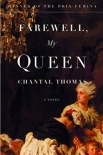Farewell, My Queen Black Moishe (short novels in english .txt) 📖

- Author: Black Moishe
Book online «Farewell, My Queen Black Moishe (short novels in english .txt) 📖». Author Black Moishe
Not very far, as it turned out. They were only going to the Salle du Jeu de Paume, the Tennis Court, where the National Assembly now met. It was a place all three of them knew quite well, having played any number of tennis matches there when they were young. But under the circumstances, the place had presumably lost something of its familiarity. The King was walking faster and faster, head down while the crowd acclaimed him. The Count d’Artois, keeping almost abreast of him, was being heartily booed. The Count de Provence, left hopelessly behind, perspiring freely and out of breath, was looking around for a chair to rest on. We went with them as far as the doorway. There we would be obliged to stop, and we watched enviously as Monsieur de La Tour du Pin, in his capacity as a Representative of the Nobility, went on into the Tennis Court. We remained outside, while round us the ranks of the crowd were swelling. After a few minutes, during which we could not hear anything, there was applause, then shouts, then once again nothing audible, and finally roars of joy. “That bodes well,” Honorine whispered. And already, before the King and his brothers had come back out, some highly excited young men appeared who had come to give the news. So that bit by bit, we were able to piece together everything that had transpired.
The King had declared before the National Assembly: “There are no matters more pressing or that touch my heart more deeply than the fearful disorders that reign in the capital city . . . ” At the start, he had been listened to attentively but with hostility. The public was expecting a new edition of his earlier declarations and his reiterated determination not to yield. Then, when he had announced the reason for his presence, there was endless applause. It was difficult to hear him over the uproar triggered by his announcement. And the King, who upon those previous occasions had been listened to in glum silence, was moved by the enthusiasm of the Representatives. He could not go on speaking. After several attempts, he had finally managed to conclude: “. . . and relying upon the love and faithfulness of my subjects, I have ordered the troops to withdraw from Paris and Versailles. I authorize you and even urge you to make my intentions known throughout the capital city.” In the Assembly the tears and transports of delight had risen to fever pitch. And even after a formal response from Bailly, President of the Assembly, reminding everyone present that the dismissal of ministers dear to the Nation was chiefly responsible for the troubles, ovations went on undiminished.
When the King emerged, nothing could have equaled the happiness of his demeanor. His words had produced a triumph. And to my knowledge, it was surely the first time they had produced any effect other than discouragement. He was intoxicated by this oratorical success. Along his path, the shouts and tears went on unceasingly. Some, in the excess of their enthusiasm, lay down on the ground so he would walk on them.
Where the King’s departure had been unobtrusive, his return bordered on mass delirium. It took him more than an hour to cover the short distance from the Tennis Court to the château. His brothers, this time, were walking ahead of him. They were surrounded, or followed, by all the Representatives. The King walked on, to uninterrupted acclaim from the crowd, with their shouts of: Long live the King, Long live the Nation, Long live Liberty. The Representatives of the three Orders had joined hands, to form a chain and an enclosure in the middle of which the King, the Count de Provence, and the Count d’Artois moved onward. The King was going along with the same heavy, ungainly walk, but his head was no longer bowed. Very close to him the Count de Provence showed every sign of exhaustion; he was virtually being carried by the gentlemen whose arms supported him. The Count d’Artois, meanwhile, driven by a crude streak in his nature that all too often got the better of him, was responding with insults to any Representative who came close enough to touch his person. His brothers’ ill humor did not affect the King. He was savoring his triumph, greedily drinking in the expressions of his people’s love, and becoming intoxicated with both. The Representatives, hands linked, were endeavoring to keep the crowd at a distance, but the crowd was hard to keep in check. People wanted to come close to the King; they wanted to touch him. A woman of the people had tried to kiss him. “Let her come to me,” he said. She had thrown her arms around his neck with an impetus that sent him staggering. The King seemed utterly bewitched by the ecstatic sense of communion with the multitude. So often, over the past several days, he had felt inclined to “scold” his people; now he could love them again, and his sternness melted in the joy of this reconciliation. When the King had returned to the château, he





Comments (0)